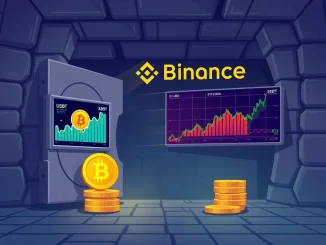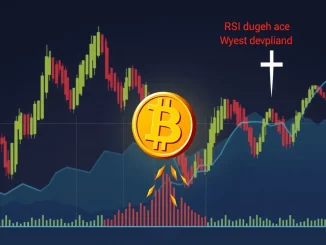
Recent developments in the Middle East have heightened concerns globally. The **Iran Israel conflict** has seen a significant escalation, with Iran issuing a stern warning that could have far-reaching consequences, potentially impacting everything from regional stability to global financial markets, including the cryptocurrency space.
Understanding the Escalation: The Retaliation Threat
According to reports from sources monitoring the region, Iran’s Armed Forces have explicitly warned Israel to prepare for severe consequences and a strong retaliation. This warning follows earlier reports that Israel had targeted sites within Iran. The situation is tense, with accusations also leveled against the United States, alleging full cooperation with Israel in these actions.
Key points from the recent escalation include:
- Iran’s military warning of severe retaliation against Israel.
- Accusations by Iran against the U.S. for alleged cooperation.
- Reports of Israel targeting Iranian sites.
This exchange marks a dangerous moment, raising the specter of broader conflict in an already volatile region.
How Does Geopolitical Tension Impact Global Markets?
Increased **geopolitical tension**, particularly involving major players or critical regions like the Middle East, historically leads to significant reactions in global financial markets. Uncertainty is the primary driver of this reaction.
Here’s how rising tensions can affect markets:
Increased Volatility: Markets dislike uncertainty. Threats of retaliation and military action cause rapid price swings in stocks, commodities, and currencies.
Shift to Safe Havens: Investors often move capital towards assets traditionally seen as ‘safe havens’ during times of crisis. Gold, certain government bonds, and sometimes the U.S. dollar see increased demand.
Energy Market Impact: The Middle East is crucial for global energy supply. Escalation here can directly impact oil and gas prices, leading to wider economic effects like inflation.
Supply Chain Disruptions: Conflict can disrupt shipping lanes and supply chains, affecting global trade and business operations.
Investor Confidence: Prolonged tension erodes investor confidence, potentially leading to reduced investment and slower economic growth.
While cryptocurrency markets are distinct, they are not immune to these broader economic and geopolitical forces.
What Does This Mean for Crypto Amidst Market Uncertainty?
The **market uncertainty** created by the escalating **Iran Israel conflict** raises questions for cryptocurrency holders and traders. Historically, Bitcoin and other cryptocurrencies have shown varied reactions to geopolitical events.
Considerations for crypto markets:
Correlation with Traditional Markets: Crypto markets often show correlation with traditional risk assets like stocks. A downturn in global markets due to geopolitical fears could potentially pull crypto prices down as well.
Safe Haven Debate: Some argue Bitcoin can act as a digital safe haven, independent of traditional finance. However, its volatility means this status is still debated and not consistently proven during crises.
Liquidity and Sentiment: Global fear can lead investors to cash out of riskier assets, including crypto, to hold more liquid assets or traditional safe havens.
Impact of Sanctions/Regulations: Geopolitical events can trigger new sanctions or regulatory discussions that might indirectly affect the crypto ecosystem.
While the direct link might not always be clear, the general climate of fear and uncertainty driven by the **retaliation threat** and rising tensions can significantly influence investor sentiment and capital flows across all asset classes.
Analyzing the Global Impact Beyond the Conflict Zone
The potential **global impact** of the **Iran Israel conflict** extends far beyond the immediate region. As mentioned, energy markets are particularly vulnerable, with potential price spikes impacting economies worldwide.
Furthermore, the involvement of the United States, even through accusations of cooperation, highlights the potential for this conflict to draw in other international players, complicating diplomatic efforts and increasing the risk of wider instability.
The ripple effects of such a conflict can include:
- Higher energy costs for consumers and businesses.
- Increased inflation pressures globally.
- Disruption to international trade routes.
- A general slowdown in global economic activity.
These macroeconomic factors, while not directly tied to blockchain technology, create the economic environment in which cryptocurrency markets operate. Understanding these broader impacts is crucial for any investor navigating volatile times.
Preparing for Potential Volatility: Actionable Insights
Given the rising **geopolitical tension** and the explicit **retaliation threat**, what steps can investors, including those in the crypto space, consider?
Here are some actionable insights:
Stay Informed: Keep track of reliable news sources regarding the conflict and its potential economic implications.
Assess Risk Tolerance: Re-evaluate your investment portfolio and ensure it aligns with your comfort level for risk during uncertain periods.
Diversification: Ensure your investments are diversified across different asset classes and sectors to mitigate risk.
Long-Term Perspective: Avoid making impulsive decisions based on short-term market reactions to news events. Focus on your long-term investment strategy.
Consider Liquidity: Have some liquid assets available if needed, rather than having all capital tied up in potentially volatile investments.
While no one can predict market movements with certainty, being prepared for potential volatility stemming from the **Iran Israel conflict** is a prudent approach.
Conclusion: Navigating Uncertainty Amidst Rising Tensions
The escalating **Iran Israel conflict**, marked by Iran’s severe **retaliation threat** and accusations against the U.S., introduces a significant layer of **geopolitical tension** into the **global impact** landscape. This situation inherently creates **market uncertainty** across traditional financial systems and can influence the cryptocurrency space.
While the direct correlation between this specific conflict and crypto prices isn’t a simple cause-and-effect, the broader economic environment shaped by such crises—including potential inflation, supply chain issues, and a general risk-off sentiment—undeniably affects all markets. Staying informed, maintaining a diversified portfolio, and focusing on long-term goals are key strategies for navigating these turbulent times.



